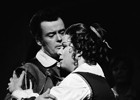ORFEO International – Catalogue
CDs
Der Freischütz is part of the standard repertory of every opera house in the German-speaking world, and yet the production that opened at the Vienna State Opera in May 1972 was the first that had been staged in the house for a quarter of a century. 
Gundula Janowitz
Foto: Foto FayerThere could of course be no question of the sort of routine performance that is all too often seen as a matter of course in other major houses, and, indeed, the live performance of the first night that is now available on the Orfeo label makes that abundantly plain. From the opening bars of the overture, Karl Böhm and the Vienna State Opera Orchestra leave the listener in no doubt that the contrasts inherent in the score are graphically highlighted in the present performance: the blackly Romantic demonism of the work is as sharply delineated as the homeliness of its bourgeois Biedermeier setting. The dialogue is mercifully free of tedium and tweeness thanks to the cuts made by the director Otto Schenk and to its delivery by a team of singers headed by Gundula Janowitz’s altogether ideal Agathe.
Touching in the unemotional simplicity that she brings to Weber’s melodic lines, she none the less misses none of the warmth and inwardness of the part. Her constant companion onstage is Renate Holm, who brings to the part of Aennchen a similar degree of cheerfulness and naturalness and just the right amount of cheeky wit. The men are no less distinguished in their different ways: here as elsewhere James King’s dramatic and yet attractive voice demonstrates yet again why in the 1960s and 1970s he was always the first choice in Heldentenor roles that required both youthful brilliance and baritonal richness. Another singer who enjoyed international acclaim at this time was Karl Ridderbusch, who made a speciality of shady bass characters such as Caspar, a role whose demands in terms of range and flexibility mean that it is often given to singers with lighter voices.
As always at the Vienna State Opera, the smaller roles are all cast from strength. Foremost among them are the Kilian of Heinz Zednik, who finds just the right note of malice in his mocking song, anticipating his legendary Bayreuth Loge and Mime, and Eberhard Waechter’s Prince Ottokar, who strikes a skilful balance between jovality and authority, while Franz Crass as the Hermit and deus ex machina brings to his part all the requisite beauty of sound.
|